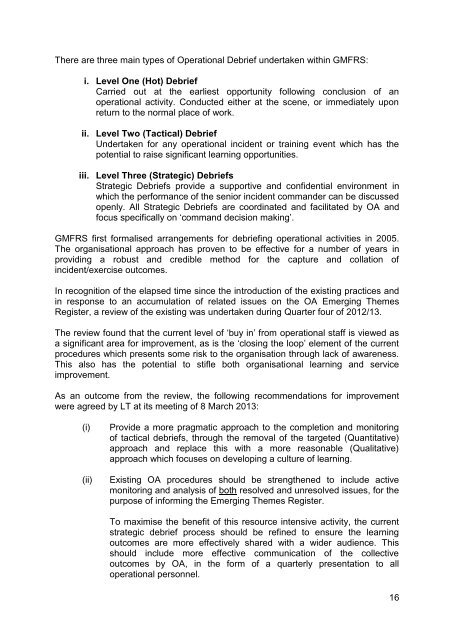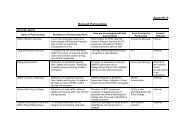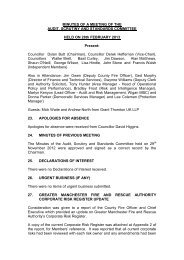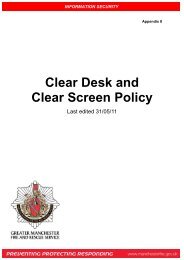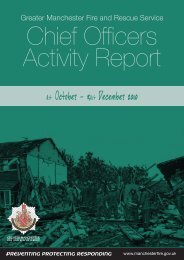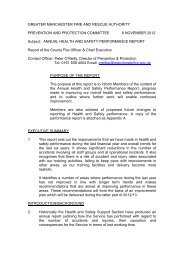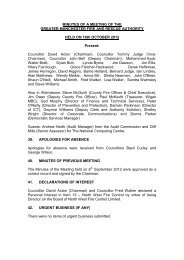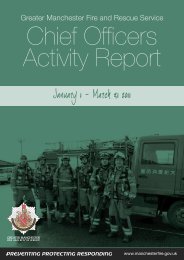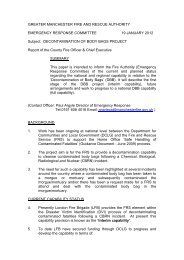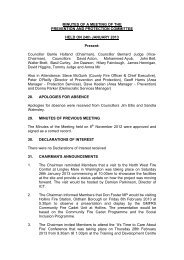Appendix A , item 39. PDF 1 MB - Greater Manchester Fire and ...
Appendix A , item 39. PDF 1 MB - Greater Manchester Fire and ...
Appendix A , item 39. PDF 1 MB - Greater Manchester Fire and ...
You also want an ePaper? Increase the reach of your titles
YUMPU automatically turns print PDFs into web optimized ePapers that Google loves.
There are three main types of Operational Debrief undertaken within GMFRS:<br />
i. Level One (Hot) Debrief<br />
Carried out at the earliest opportunity following conclusion of an<br />
operational activity. Conducted either at the scene, or immediately upon<br />
return to the normal place of work.<br />
ii. Level Two (Tactical) Debrief<br />
Undertaken for any operational incident or training event which has the<br />
potential to raise significant learning opportunities.<br />
iii. Level Three (Strategic) Debriefs<br />
Strategic Debriefs provide a supportive <strong>and</strong> confidential environment in<br />
which the performance of the senior incident comm<strong>and</strong>er can be discussed<br />
openly. All Strategic Debriefs are coordinated <strong>and</strong> facilitated by OA <strong>and</strong><br />
focus specifically on ‘comm<strong>and</strong> decision making’.<br />
GMFRS first formalised arrangements for debriefing operational activities in 2005.<br />
The organisational approach has proven to be effective for a number of years in<br />
providing a robust <strong>and</strong> credible method for the capture <strong>and</strong> collation of<br />
incident/exercise outcomes.<br />
In recognition of the elapsed time since the introduction of the existing practices <strong>and</strong><br />
in response to an accumulation of related issues on the OA Emerging Themes<br />
Register, a review of the existing was undertaken during Quarter four of 2012/13.<br />
The review found that the current level of ‘buy in’ from operational staff is viewed as<br />
a significant area for improvement, as is the ‘closing the loop’ element of the current<br />
procedures which presents some risk to the organisation through lack of awareness.<br />
This also has the potential to stifle both organisational learning <strong>and</strong> service<br />
improvement.<br />
As an outcome from the review, the following recommendations for improvement<br />
were agreed by LT at its meeting of 8 March 2013:<br />
(i)<br />
(ii)<br />
Provide a more pragmatic approach to the completion <strong>and</strong> monitoring<br />
of tactical debriefs, through the removal of the targeted (Quantitative)<br />
approach <strong>and</strong> replace this with a more reasonable (Qualitative)<br />
approach which focuses on developing a culture of learning.<br />
Existing OA procedures should be strengthened to include active<br />
monitoring <strong>and</strong> analysis of both resolved <strong>and</strong> unresolved issues, for the<br />
purpose of informing the Emerging Themes Register.<br />
To maximise the benefit of this resource intensive activity, the current<br />
strategic debrief process should be refined to ensure the learning<br />
outcomes are more effectively shared with a wider audience. This<br />
should include more effective communication of the collective<br />
outcomes by OA, in the form of a quarterly presentation to all<br />
operational personnel.<br />
16


